Essential Insights into Prenatal Cognitive Development: Stages & Influences
"As I continued to grow, I realized that my healthy beginnings in my mother's womb had set the foundation for my bright future."
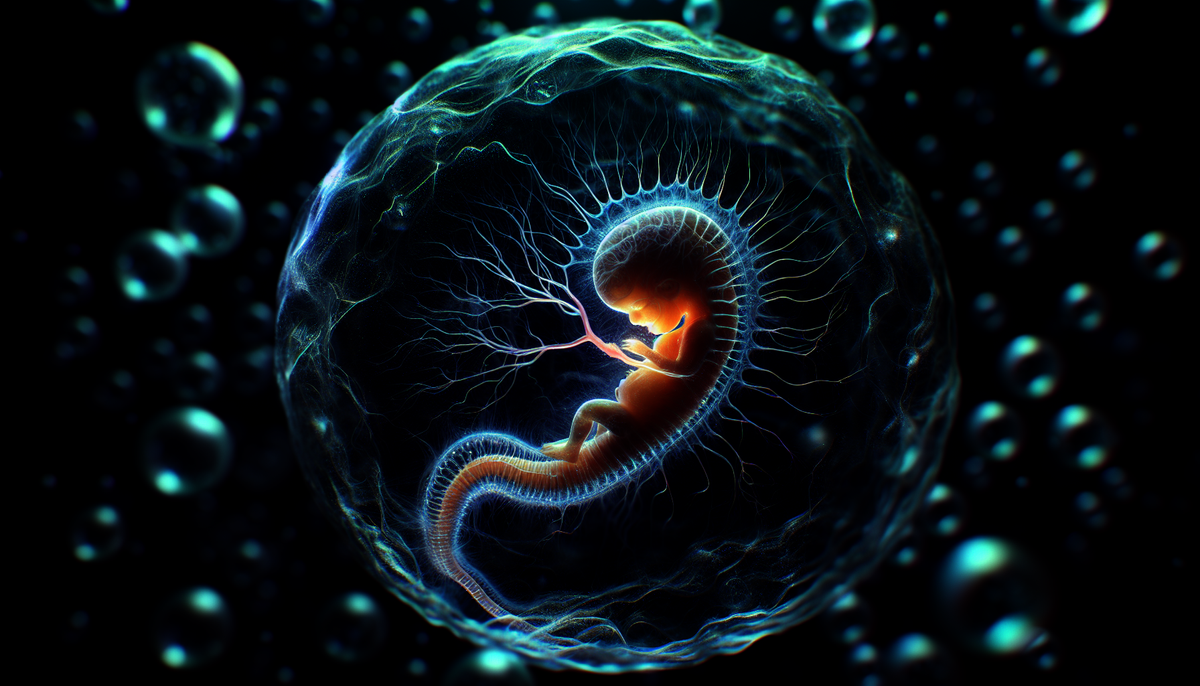
Originally Published Dec 11, 2023
Edited 12/13/2023
Arted By KREA AI
Edited By SHiNER The Human
Surfy AI is an SEO AI Writing Assistant
KREA AI is a Machine-Learning GPT Artist
SHiNER The Human is a Human Editor. Blame him for any errors.
Thanks For Reading!
Uncovering the Secrets of Brain Maturation in the Womb

Embarking on the enchanting and awe-inspiring journey of prenatal cognitive development is akin to unfurling a grand blueprint of human existence. This wondrous and mysterious process weaves the very fabric of our thinking, learning, and interaction with the world around us. Ah, but what marvels occur during this transformative epoch, as new neural connections are forged and cognitive abilities take shape? How does the mystical, nurturing womb environment shape and form the foundation of prenatal cognitive prowess, setting the stage for a lifetime of intellectual growth and potential? And, perchance, how might we, as guardians of this extraordinary voyage, nurture and amplify the innate capacities that are being woven within? These questions beckon us to explore the depths of this miraculous journey, to appreciate the intricate intricacies of the prenatal mind, and to unlock the boundless possibilities that lie within the realm of early cognitive development.
Essential Insights into Prenatal Cognitive Development: Stages & Influences
Understanding the journey of prenatal cognitive development, from the first moments of conception to the moment of birth, is like unfolding a master blueprint of human life. This intricate process shapes the foundation of our abilities to think, learn, and interact with the world around us. But what exactly happens during this formative period? How does the environment inside the womb influence prenatal cognitive development? And how can we support and enhance this process?
Key Takeaways
- Prenatal cognitive development progresses through distinct stages of growth and involves the formation of neural pathways, organogenesis, sensory integration, movement control & more.
- Environmental influences such as maternal nutrition, stress & substance exposure can significantly impact fetal brain development.
- Early interventions for at-risk pregnancies are important to optimize cognitive outcomes in the child and advancements in prenatal assessment techniques enable earlier detection of potential issues.
Understanding Prenatal Cognitive Development
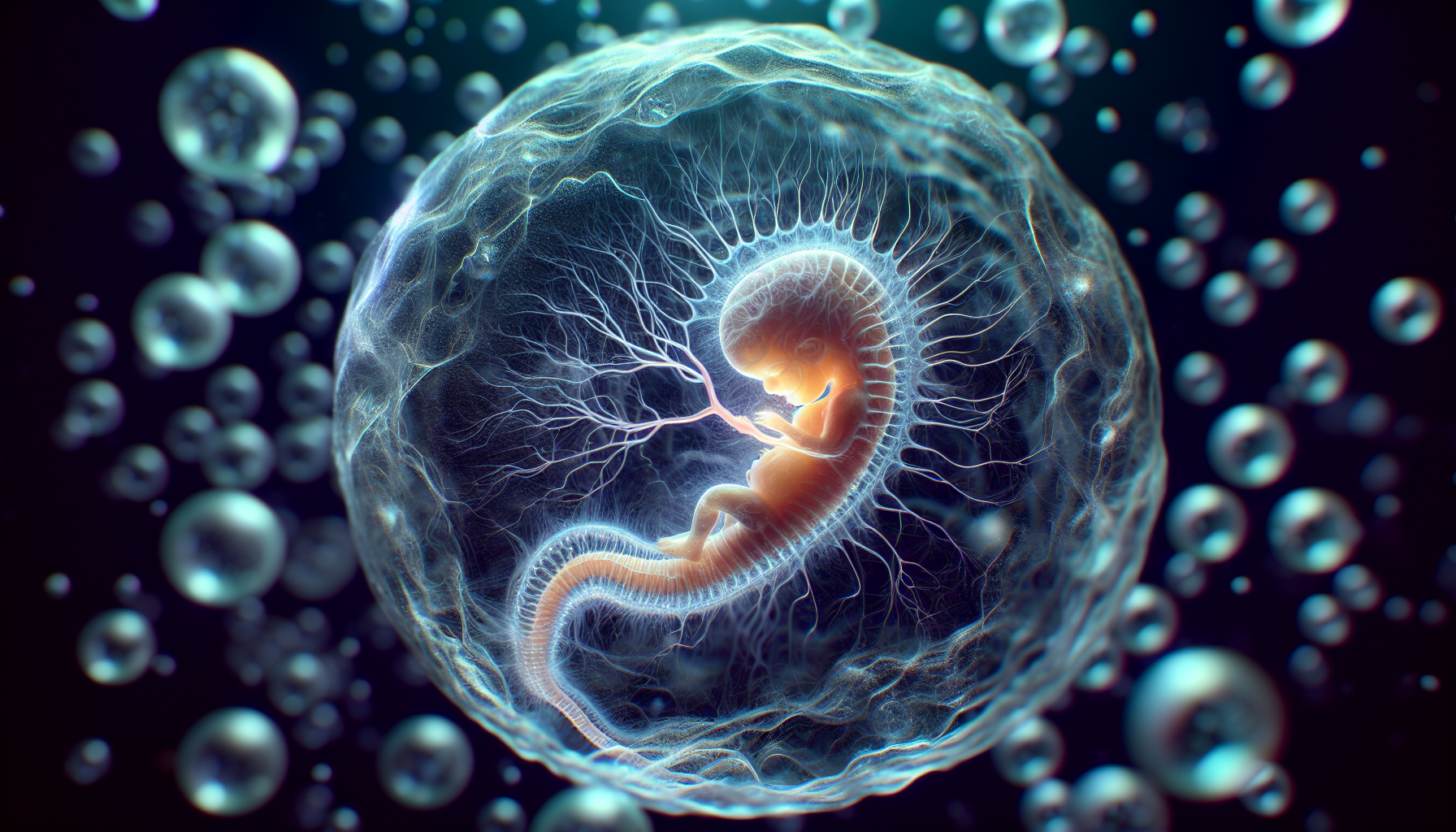
The story of prenatal cognitive development begins with three key stages: the germinal, embryonic, and fetal stages. Each of these stages plays a unique role in the formation of blood cells, the neural structures, growth and complexity of the brain, and the functionality stepping stones that occur throughout pregnancy. It is during these stages that prenatal development occurred, shaping the cognitive abilities of the growing fetus.
The germinal stage, which lasts about 14 days, begins at conception when a sperm and an egg unite in the fallopian tube13. The fertilized egg, now called a zygote, starts its journey down the fallopian tube towards the uterus34. During this journey, the zygote undergoes rapid cell division and growth, transforming into a solid ball of cells called a morula and then into a hollow ball of cells known as a blastocyst8.

The Emergence of Neural Structures
The embryonic stage, following the germinal stage, is a time of significant transformation. It is during this period that the neural tube forms, the precursor to the central nervous system, which will later develop into the brain and spinal cord. Like a delicate origami, the neural tube folds and refines itself, eventually forming brain vesicles that will develop into the forebrain, midbrain, and hindbrain.
By the second month of gestation, the cerebral cortex, the outer layer of the brain, begins to form, marking another key stepping stone in the journey of prenatal cognitive development.
Brain Growth and Complexity
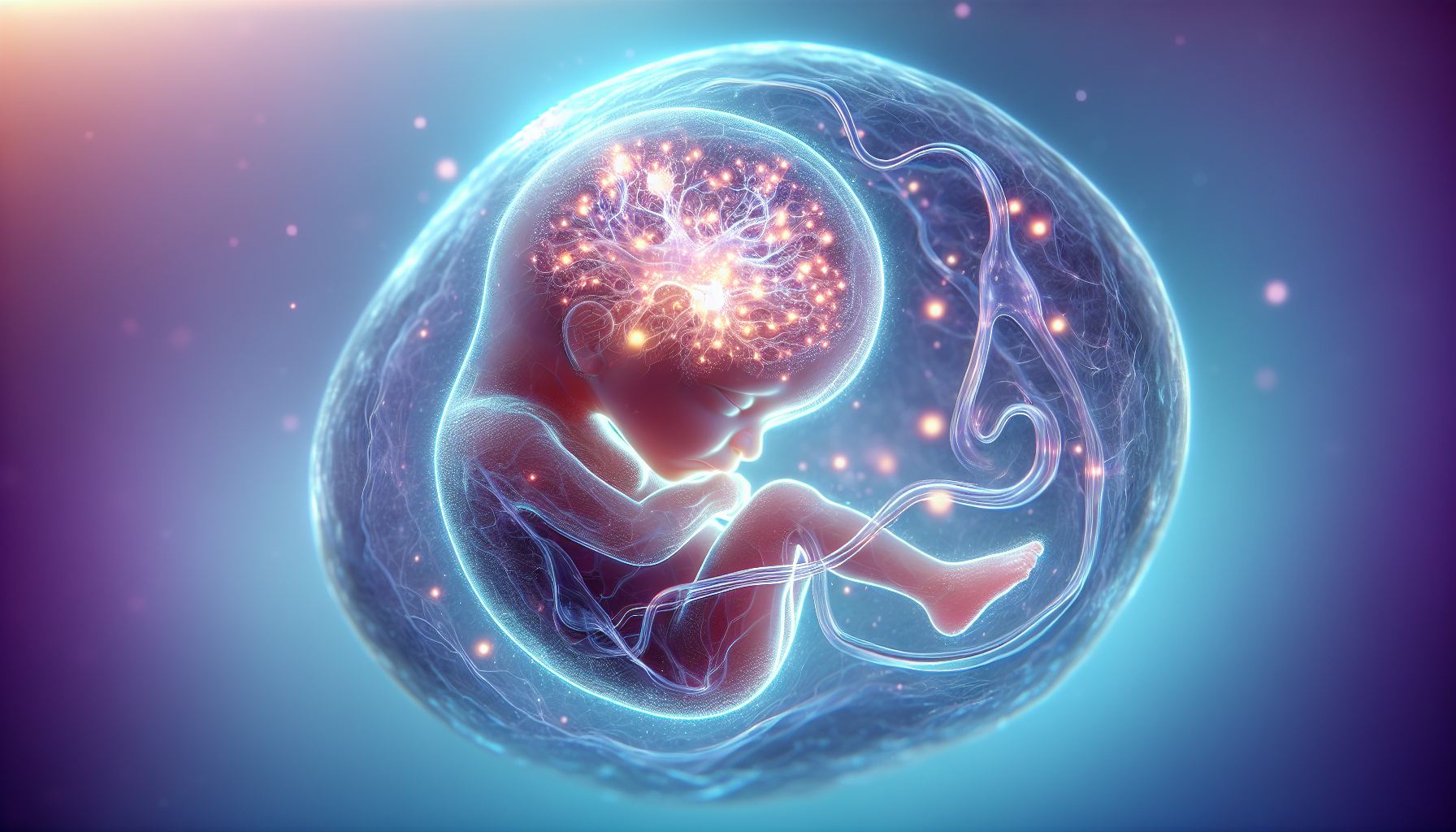
As we journey further into the fetal stage, the brain begins to grow and complexify at an astonishing rate. Neurons, the building blocks of the nervous system, start to form around day 42 after conception. Once they reach their destined location within the brain, they begin to form connections with other neural cells, establishing rudimentary neural networks.
By the eighth week of development, the embryo has developed all the necessary organs and body parts. These include:
- the heart
- lungs
- brain
- etc.
Everything except for the sex organs. As the brain continues to evolve, the developing fetus also starts to acquire the ability to move, marking yet another significant stepping stone in prenatal cognitive development.
Stepping Stones in Fetal Brain Functionality
During the third trimester, the fetus further develops its ability to move and control movements. It also begins storing information gained from the senses. The sensory system demonstrates integration and functionality during this trimester, and the fetus's organ systems is believed to acquire the capacity to recall. By the eighth month of gestation, the visual cortex and auditory cortex are developed.
These stepping stones in fetal brain functionality include:
- Development of chest muscles
- Diaphragm movement
- Sleep cycles
- Sensory system integration
These stepping stones prepare the fetus for life outside the womb.
The Embryonic Stage: A Crucial Phase for Cognitive Foundations
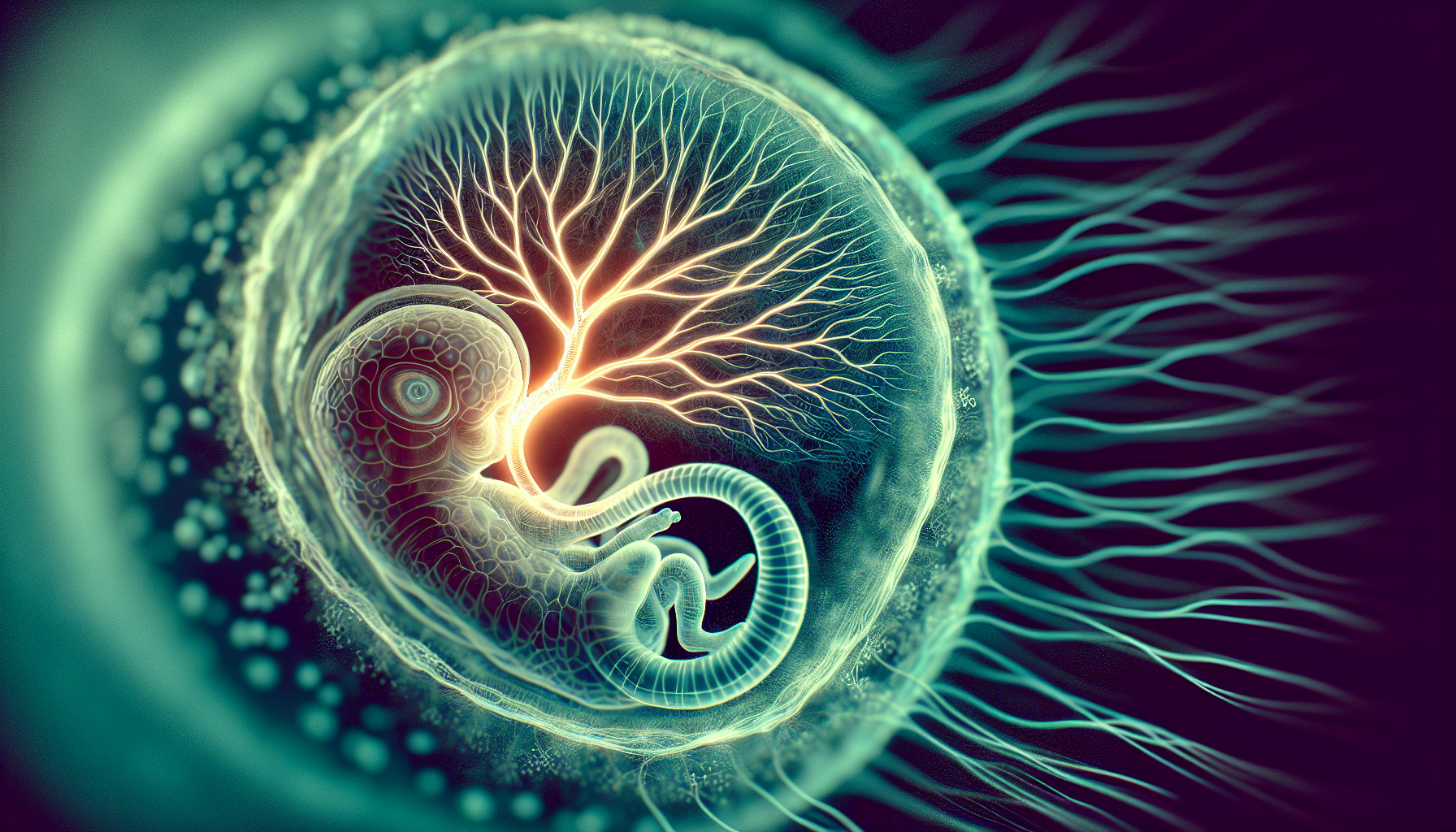
The embryonic stage is characterized by the formation of cognitive foundations, which is a crucial part of embryonic development. Neurulation, the formation of neural pathways, takes center stage. This process is closely followed by organogenesis, the development of organs, which plays a vital role in brain development.
The embryonic environment, extending from the third week to the eighth week of gestation, is defined by the period of organogenesis. The placenta, which serves as a conduit for nourishment and oxygen, enables their transfer from the mother to the developing embryo. This delicate interaction during the embryonic stage lays the groundwork for lifelong cognitive development.
Neurulation: The Formation of Neural Pathways
During neurulation, the neural tube forms, creating the foundation for the brain and spinal cord. This process, occurring between the 4th and 20th weeks of gestation, is pivotal for cognitive development. Various signaling pathways influence the formation of neural pathways, including:
- Bone Morphogenetic Proteins (BMPs)
- Fibroblast Growth Factors (FGFs)
- Wnt proteins
- Notch ligands
These pathways facilitate the transmission of information between different parts of the brain, enabling a variety of cognitive processes, including:
- perception
- attention
- memory
- decision-making
Organogenesis and Brain Development
The process of organogenesis, the development of organs from the three germ tissue layers of the embryo, plays a crucial role in brain development. At the eighth week of development, the embryo has formed all necessary organs. The sex organs, however, are still forming and do not complete their development until a later stage. The embryonic period marks the point when sex organs begin to develop, as well as the formation of the central nervous system and brain. At the end of this period of physical development, the fundamental structures of both have been established.
These early human development stages lay the groundwork for the cognitive journey that lies ahead.
The Role of the Embryonic Environment
The embryonic environment, comprising the period of organogenesis, plays a significant role in shaping cognitive foundations. Elements in the embryonic environment, such as maternal nutrition, infection, and stress, can affect the cognitive development of the offspring.
Environmental influences on prenatal cognitive development, including emotional, behavioural, and cognitive outcomes, also play a significant role. By ensuring a healthy prenatal environment, we can reduce the risk of complications, such as:
- Sudden infant death syndrome (SIDS)
- Low birth weight
- Premature birth
- Developmental delays
After birth, the blood vessels play a crucial role in the birth defects the body’s overall function.
The Fetal Stage: Refining Cognitive Capabilities
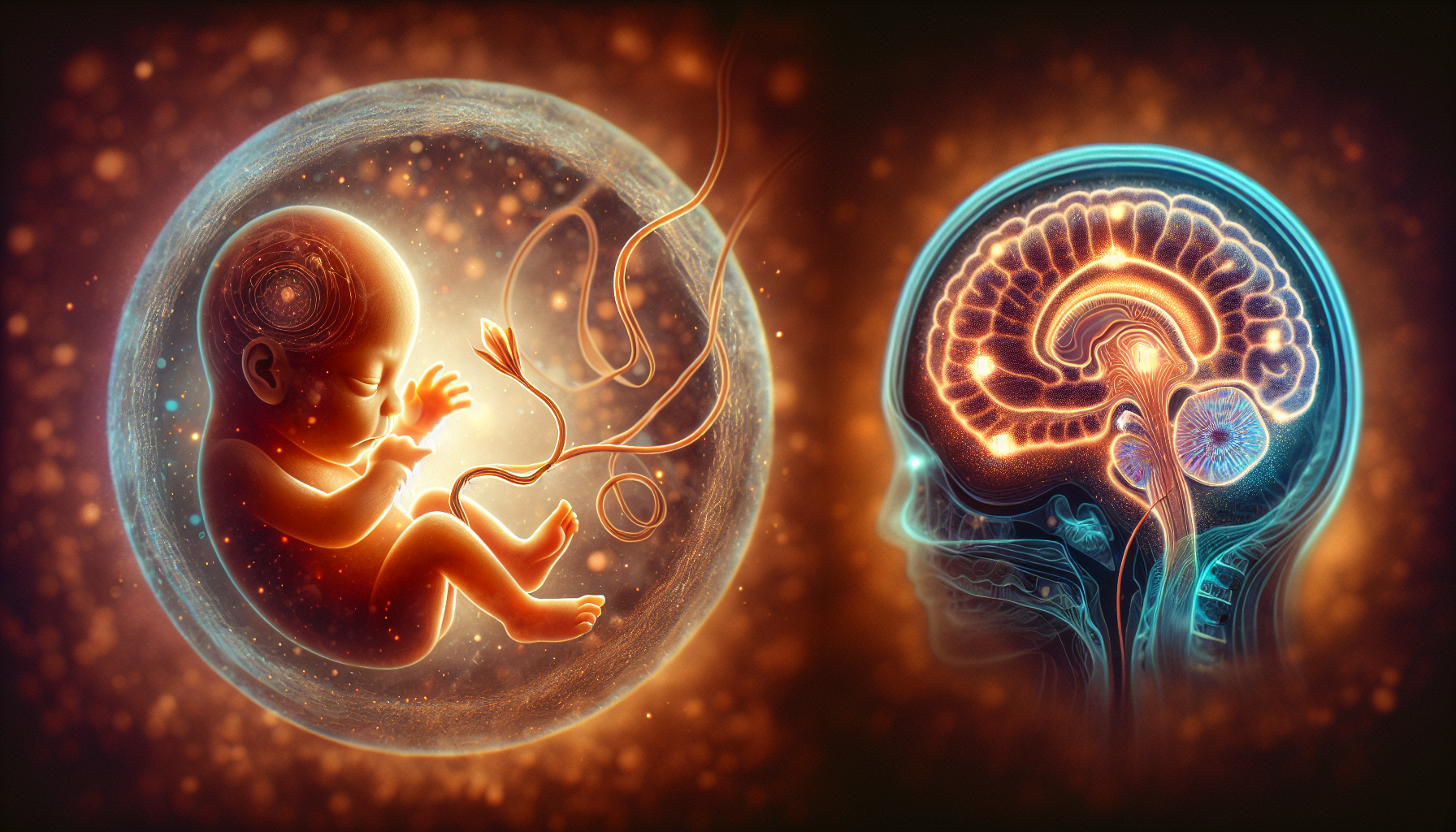
Prenatal cognitive development progresses significantly during the fetal stage, with fetal development playing a crucial role. This is a period of refinement, where the brain of fetus continues to to grow and develop, nearly doubling in size from weeks 16 to 28. At this stage, the fetus begins to exhibit coordinated brain activity necessary for consciousness, which is not observed until 24-25 weeks of pregnancy.
Essential cognitive functions emerge, sensory and motor development occur, and the fetus prepares for birth by developing necessary skills and reflexes.
The Expansion of Cognitive Functions
As the fetus' brain develops further, cognitive functions expand. The brain becomes more responsive and capable of processing information. Some of the cognitive skills that develop in the fetus before birth include:
- Brain development
- Information processing
- Pattern recognition
- Learning
Moreover, fetal brain activity establishes the basis for brain function and continues to progress post-birth.
Sensory and Motor Development
Sensory and motor development occur during the fetal stage, with the fetus experiencing sensations and learning to control reactions. The fetus begins developing motor skills in the initial few weeks of gestation, with the most common motor patterns being:
- Spontaneous startles
- General movements
- Isolated movements
- Twitches
The fetus learns to regulate its reactions through sensory experiences and stimuli, marking another significant stepping stone in prenatal cognitive development.
Preparing for Birth: Cognitive Readiness
Cognitive readiness for birth involves the development of essential skills and reflexes needed for survival outside the womb. It has been suggested that during the fetal stage, fetuses acquire the ability to control their reactions through sensory experiences and stimuli.
The grasp reflex, an involuntary prehensile response, emerges around 16 weeks gestation, enabling the baby to grasp objects and interact with the environment. By the eighth month of gestation, the visual cortex and auditory cortex are developed, preparing the fetus for life outside the womb.
Environmental Influences on Prenatal Cognitive Development
Environmental factors greatly influence prenatal cognitive development. The effect of maternal nutrition, stress, and substance exposure can have a profound impact on the cognitive development of the unborn child. For instance, maintaining a healthy diet, as well as abstaining from alcohol and tobacco, can have a beneficial effect on cognitive outcomes for the child.
On the other hand, maternal stress during pregnancy may result in behavioral and social difficulties for pregnant woman and the child.
Nutritional Contributions to Brain Development
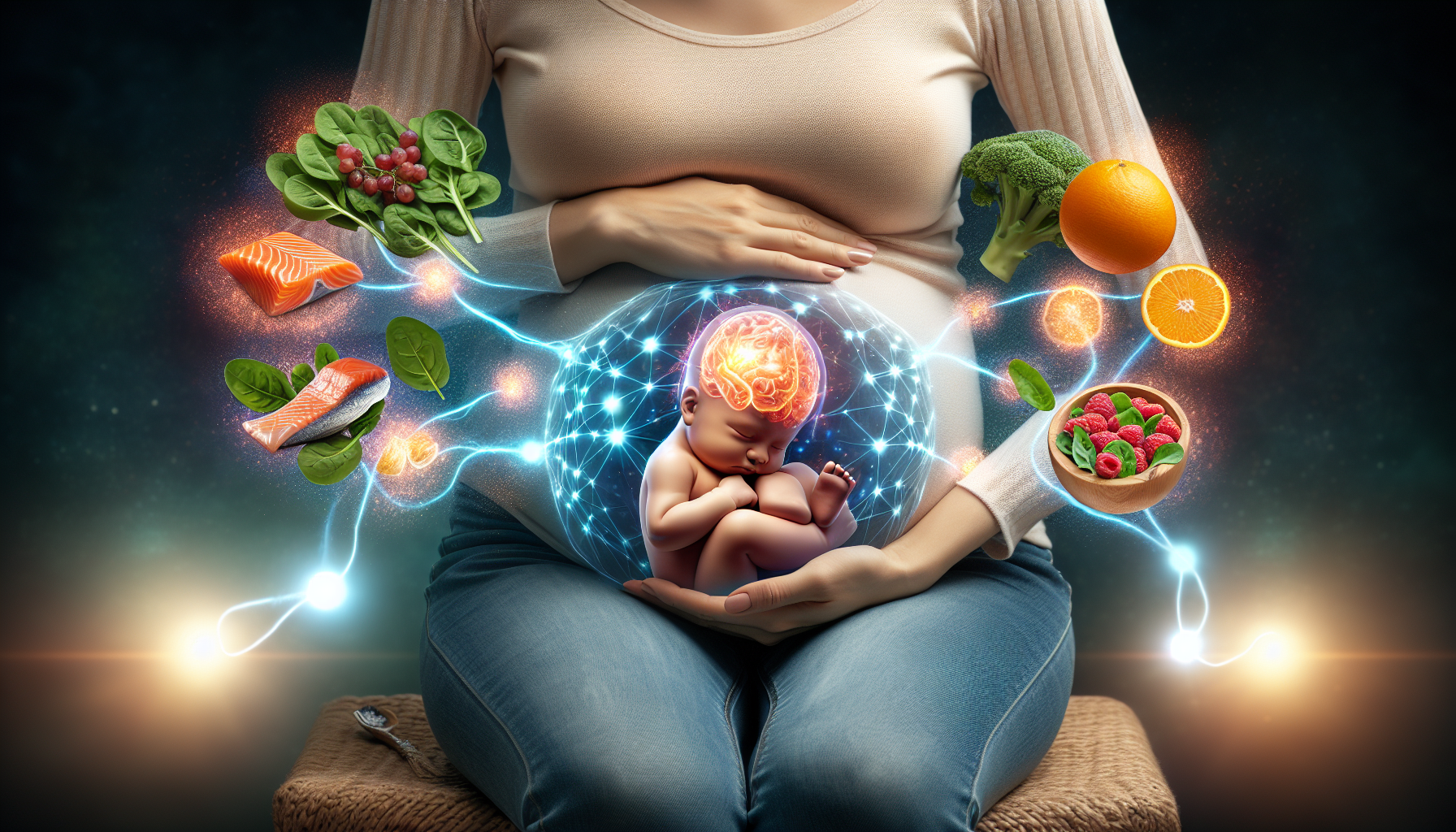
Nutrition plays a crucial role in prenatal cognitive development. Certain nutrients, such as omega-3 fatty acids, are known to be of great importance in prenatal cognitive development. They have been observed to have an effect on fetal and infant neurodevelopment, thus contributing to brain health and aiding in the development of the brain in the fetus. Some key nutrients for prenatal cognitive development include:
- Omega-3 fatty acids
- Folic acid
- Iron
- Iodine
- Choline
Ensuring a balanced and nutrient-rich diet during pregnancy can help support optimal cognitive development in the fetus.
The other nutrients deemed essential for prenatal brain development are dietary polyunsaturated fatty acids (PUFAs), protein, iron, zinc, copper, choline, folate, and iodine.
Impact of Prenatal Maternal Stress
Prenatal maternal stress has been shown to have a deleterious effect on cognitive development, resulting in behavioural and social difficulties for the child. Some of the effects of high levels of prenatal stress on brain development include:
- Lower scores on tests of mental development
- Impaired memory and attention
- Increased risk of anxiety and depression
- Altered stress response
Expectant mothers need to manage their stress levels during pregnancy to promote healthy brain development in their children.
Also, maternal emotional stress during pregnancy is associated with the cognitive development of their offspring, suggesting that high levels of anxiety, depression, and stress in pregnant women could potentially hinder their children’s cognitive development.
Risks of Substance Exposure
Exposure to substances such as alcohol, tobacco, and drugs during pregnancy can harm fetal brain development and cognitive function. For example, prenatal alcohol exposure, which can lead to fetal alcohol spectrum disorders, has been associated with negative implications on cognitive development, including:
- Increased risk of psychopathology
- Attention deficits
- Impulsiveness
- Behavioural issues
Similarly, prenatal exposure to smoking during pregnancy can have deleterious effects on fetal brain development, potentially leading to suboptimal long-term brain development for the offspring.
Protecting and Enhancing Prenatal Cognitive Development
Measures to protect and enhance prenatal cognitive development include regular prenatal care, a healthy lifestyle, and early interventions for high-risk pregnancies. Such steps can help mitigate potential cognitive development issues and improve outcomes.
For example, the provision of adequate nutrition is essential for the healthy development of the human embryo and fetus. Similarly, maintaining a balanced diet and engaging in appropriate physical activity can ensure optimal outcomes for both the mother and the infant.
Importance of Routine Prenatal Care
Routine prenatal care is essential for monitoring fetal cognitive development and addressing potential issues early on. Regular prenatal care appointments should be scheduled once a month from weeks 4 to 28, every two weeks from weeks 28 to 36, and once a week from weeks 36 to delivery. Regular prenatal care contributes to fetal cognitive development by regarding fetal exposure and addressing various factors that can influence brain development.
Maternal nutrition, infection, and stress during pregnancy can have a considerable impact on the developing brain. Regular prenatal care helps ensure that the mother receives adequate nutrition, identifies and treats any infections, and manages stress levels.
Lifestyle Choices and Cognitive Outcomes
Healthy lifestyle choices, such as maintaining a nutritious diet and getting regular exercise, can positively impact cognitive outcomes for the child. Maternal exercise during pregnancy has been demonstrated to have a positive effect on cognitive function in the offspring, resulting in enhanced learning and memory, reduced anxiety-like behaviours, and slight benefits for language and cognitive development.
Additionally, maternal mental health has a considerable impact on prenatal cognitive development. Elevated maternal stress during pregnancy can lead to atypical brain development and an increased risk for psychopathology in children.
Early Interventions for At-Risk Pregnancies
Early interventions for at-risk pregnancies can help mitigate potential cognitive development issues and improve outcomes. Indications of an at-risk pregnancy include high blood pressure, obesity, diabetes, epilepsy, thyroid disease, heart or blood disorders, and poorly controlled asthma. Healthcare professionals may identify at-risk pregnancies for early interventions through various methods, such as preconception care, assessing obstetrical history and clinical risk factors, carrying out health history assessments, and executing diagnostic evaluations.
Such interventions have been found to have a positive effect on the cognitive development of the fetus.
The Science Behind Prenatal Cognitive Stepping Stones
The science underpinning prenatal cognitive stepping stones encompasses the interpretation of fetal brain activity, the significance of genetics, and the advancements in prenatal cognitive assessment. Scientists employ various techniques, including ultrasound, MRI, NIRS, and EEG/MEG, to analyze and interpret fetal brain activity. This allows them to understand the development of cognitive functions and identify potential issues.
Genetics significantly contribute to cognitive development, as specific genetic factors influence brain function and intelligence. Lastly, advancements in prenatal cognitive assessment techniques enable the early detection of potential cognitive development issues and the implementation of targeted interventions.
Decoding Fetal Brain Activity
Decoding fetal brain activity helps researchers understand the development of cognitive functions and identify potential issues. Various techniques used in decoding fetal brain activity include:
- Ultrasound
- MRI
- NIRS
- EEG/MEG
Healthy cognitive development in the early stages of the fetal brain is indicated by:
- The timely occurrence of functional development
- The accelerated growth of neurons in the brain
- The lack of negative influences such as prenatal stress or excessive levels of cortisol.
The Role of Genetics in Cognitive Development
Genetics play a significant role in cognitive development, with certain genetic factors influencing brain function and intelligence. Research indicates that cognitive abilities are influenced by genetic factors, with approximately half of the variance in general cognition attributed to genetic factors.
Additionally, genetic problems can arise during prenatal development, impacting both pre- and postnatal growth. Genetic counselling can facilitate comprehension of potential cognitive developmental issues in the prenatal stage by furnishing information regarding the genetic components that could be contributing to these issues.
Advances in Prenatal Cognitive Assessment
Advances in prenatal cognitive assessment techniques allow for earlier detection of potential cognitive development issues and targeted interventions. The most recent developments in prenatal cognitive assessment techniques include:
- Non-invasive prenatal testing for diagnosing fetal genetic conditions
- Imaging the fetal brain with MRI for detailed gestational age-related assessment
- The use of intelligent measurements of the fetal head for the automatic diagnosis of microcephaly and dolichocephaly
These techniques have greatly improved our ability to assess and monitor cognitive development in the prenatal period.
These developments have enhanced the precision and effectiveness of prenatal cognitive assessment.

Summary
In the ethereal tapestry of life, the journey of prenatal cognitive development unfolds, weaving together the delicate threads of various stages, environmental influences, and genetic factors. It is a symphony of growth and transformation, a dance of intricate connections that shape the essence of human existence. As we delve into the depths of this miraculous journey, our eyes are opened to the profound significance of providing an optimal environment for the flourishing of cognitive abilities.
At the heart of this tale lies Aurora, a beacon of hope and potential. Like the first light of dawn, she embodies the promise of new beginnings and limitless possibilities. Her story, infused with the magic of healthy prenatal development, intertwines seamlessly with the wisdom garnered from her journey. From conception to birth, each shimmering stepping stone illuminates the path to cognitive prowess.
In the grand tapestry of creation, nutrition blooms as a nurturing force, fortifying the foundation of Aurora's cognitive growth. The gentle embrace of a balanced diet, rich in essential nutrients, paints strokes of vitality onto the canvas of her developing mind. Through the veils of time, we witness the profound impact of maternal nutrition and its ability to shape the landscape of her cognitive potential.
But the whispers of impact reach far beyond the realm of nutrition. The environment in which Aurora's spirit unfurls plays its part, guiding her steps on the delicate dance floor of cognitive development. It is a symphony of love and care, where stressors are diminished and harmful substances are kept at bay. Through this harmonious melody, the stage is set for Aurora to ascend to her fullest potential, unobstructed by the shadows that may seek to dim her inner radiance.
In the rhythm of life, the importance of seeking regular prenatal care becomes an anthem of protection and guidance. It is here that the guardians of Aurora's journey stand, armed with knowledge and the power to ensure that every step is taken with grace and wisdom. From the first whispers of her existence to the moment she greets the world, the symphony of prenatal care carries her through each stage of growth, fostering the seeds of cognitive brilliance.

Aurora's Adventure: A Bright Beginning
Recently, in a world filled with wonder and possibilities, there was a baby named Aurora. This baby is just like your baby. From the moment she was conceived, Aurora's journey towards becoming the best human possible began.
I was Aurora, small and nestled in my mother's womb, unaware of the incredible adventure that awaited me. The spark of life ignited within me, and I started growing rapidly, just like a beautiful flower blooming in a meadow.
As days turned into weeks, I started taking shape. My tiny body underwent amazing transformations during the early stages of my development, forming the building blocks of my bright future. My brain, the most incredible part, started to develop and grow. It was like a magical garden, full of potential and excitement.
Every day, my mother took great care of herself, eating healthy food and staying away from things that could harm me. I could feel her love and dedication as I grew stronger and more resilient with each passing day. It made me feel safe, warm, and ready to face the world.
As time went on, I began to sense the world around me. I could feel gentle movements, like a soft breeze whispering through the trees. Sounds, though muffled, reached my tiny ears, filling me with curiosity and wonder. My senses were starting to wake up, just like a sleepy bear rising from its winter slumber.
Through the darkness, I could sense light. It was as if dawn was breaking inside me. My brain was working hard, creating vital connections that would shape my ability to learn, think, and understand. I was becoming a little thinker, ready to explore the fascinating realm that awaited me outside.
In the cozy space of my mother's womb, I practiced my movements. I kicked my legs and wiggled my tiny fingers. I even tried to touch my face, as if introducing myself to the world. I was getting closer to the day when I would spread my wings and take my first breath of fresh air.
My mother's love and care continued even outside the womb. She visited the doctor regularly, ensuring that I was growing strong and healthy. The doctor guided her and provided her with valuable advice. Together, we formed a team dedicated to my growth and development.
Finally, the day arrived when I was ready to enter the world. With a burst of energy and a sprinkle of spirit, I took my first breath and opened my eyes to a whole new adventure.
As I grew older, my journey of learning and discovery continued. I learned to crawl, walk, and explore the world around me. Every day was filled with new experiences and exciting challenges. I loved to touch and feel different textures, listen to the sounds of nature, and observe the colours that painted the world.
My parents and teachers played an important role in my cognitive development. They read me stories daily, encouraged my curiosity, and patiently answered my endless questions. They believed in me and helped me unlock the power of my mind, just like a key that opens a treasure chest full of knowledge.
I discovered the joy of learning sounds, numbers, and words. With each book read to me, my imagination soared high, taking me to faraway lands and introducing me to fascinating characters. I loved to create stories of my own, letting my imagination run wild like a playful dolphin in the ocean.
Once school began, I sometimes faced tricky puzzles or difficult math problems. But I learned that with a little perseverance and a positive mindset, I could overcome any challenge. I discovered that making mistakes is a part of learning and that every mistake brings me closer to finding the right answer, just like a treasure hunter who uncovers a hidden gem after many tries.
As I continued to grow, I realized that my healthy beginnings in my mother's womb had set the foundation for my bright future. By taking care of myself through nutritious food, exercise, and plenty of rest, I nurtured my body and mind. I knew that a healthy body and a healthy mind would help me achieve great things and be the best human I could be.
Now, here I am, still on my journey of growth and learning. Every day is a chance for me to discover new things, ask questions, and dream big dreams. I know that with love, care, and a curious mind, anything is possible.
So, my dear friends, remember that deep within you, there is a spark of magic and endless possibilities. Embrace the adventure of learning, nurture your body and mind, and embrace each new day with a heart full of wonder.
For you, just like me, are on a journey to become the best humans possible.
The Beginning
Frequently Asked Questions
What is cognitive development in pregnancy?
Cognitive development in pregnancy begins in the eighth month when the auditory cortex, visual cortex and Broca's area start to function, enabling the developing baby to interpret sights and sounds and distinguish language.
Details Of Pre-Natal Cognitive Development
During the eighth month of pregnancy, a captivating and pivotal phase of cognitive development unfolds. It is during this stage that the auditory cortex begins to activate, processing a diverse range of sounds like the comforting lullabies of the mother's voice or the gentle rustling of leaves. Simultaneously, the visual cortex starts establishing its intricate connections, enabling interpretation of the splendid array of colours and shapes that surround the baby. Additionally, Broca's area, a vital brain component associated with language comprehension, initiates its functions, paving the way for the baby to comprehend and respond to words and melodies. These intricate processes enable the developing baby to perceive and differentiate various sounds and sights, establishing the foundation for their future language skills. This beautiful journey of cognitive development during pregnancy sets the stage for a lifetime of language acquisition and expression, shaping the way they interact with the world and communicate their deepest thoughts and feelings.
When does a fetus develop cognitive function?
At 6 weeks of pregnancy, the neural tube closes and the brain begins to form three areas. By 8 weeks, electrical activity is seen in the brain, allowing for spontaneous movements. Cognitive function develops after 25 weeks, allowing the fetus to process sensory stimuli and discriminate between different sounds.
Click For More Detail By Perplexity AI
The development of cognitive function in a fetus is a complex process that begins early in pregnancy and continues until birth. The initial stages of brain development start around the fifth week after conception, when the first neural cells begin to divide and differentiate into neurons and glia, the two types of cells that form the nervous system[6]. The neural plate, which is the foundation of the brain and spinal cord, forms around this time and folds onto itself to form the neural tube by about the sixth week of pregnancy[1][6].
The first synapses, which are crucial for transmitting signals between neurons, begin forming in the fetus's spinal cord during the fifth week after conception[5]. By the sixth week, these early neural connections permit the first fetal movements that researchers can detect through ultrasound imaging[5].
The coordinated brain activity required for consciousness does not occur until around 24-25 weeks of pregnancy, marking the end of the second trimester and the beginning of the third trimester[4]. This period is crucial for the formation of the map of neural connections in the brain[4].
By the end of the second trimester, the fetus's brain activity is largely mature, which is when babies first become able to survive outside the womb[5]. The cerebral cortex, which is responsible for most of what we think of as mental life–conscious experience, voluntary actions, thinking, remembering, and feeling–only begins to function around the time gestation comes to an end[5].
In the third trimester, the fetus's brain almost triples in weight, and there is rapid development of neurons and wiring[6]. By 28 weeks, fetal brainwave activity features sleep cycles, including REM (the stage when dreaming occurs)[6].
It's important to note that while these are general timelines, individual development can vary. Factors such as maternal health, nutrition, and stress levels can impact fetal brain development[4][8].
Citations:
[1] https://flo.health/pregnancy/pregnancy-health/fetal-development/fetal-brain-development
[2] https://ehp.niehs.nih.gov/ehp2268-zh
[3] https://www.healthline.com/health/when-does-a-fetus-develop-a-brain
[4] https://study.com/learn/lesson/prenatal-brain-development-timeline-stages-fetal.html
[5] https://www.zerotothree.org/resource/when-does-the-fetuss-brain-begin-to-work/
[6] https://www.whattoexpect.com/pregnancy/fetal-development/fetal-brain-nervous-system/
[7] https://www.babycenter.com/pregnancy/your-baby/fetal-development-your-babys-brain_20004924
[8] https://www.verywellfamily.com/everything-you-need-to-know-about-fetal-brain-development-4707581
What happens to the brain during prenatal development?
During prenatal development, the brain undergoes a rapid production of neurons and explosive growth, which leads to its separation into left and right hemispheres. By the seventh month, the fetus is emitting its own brain waves which can be detected through the mother's abdomen.
What are the 3 main stages of prenatal development?
- Germinal stage: Conception to two weeks
- Embryonic period: Week three to eight
- Fetal period: Week nine until birth
The 3 main stages of prenatal development in detail:
1. Germinal Stage
- This stage begins at conception when a sperm and an egg unite in one of the two fallopian tubes, forming a zygote.
- The germinal stage lasts about two weeks, during which the zygote travels down the fallopian tube to the uterus and implants in the uterine lining.
2. Embryonic Stage
- Following the germinal stage, the embryonic stage lasts from the third week to the eighth week of pregnancy.
- During this period, the embryo undergoes significant transformation.
- Basic structures start to develop into areas that will become the head, chest, and abdomen.
- The heart begins to beat, organs form and begin to function, and the neural tube, which will develop into the spinal cord and brain, forms.
3. Fetal Stage
- The fetal stage begins around the ninth week of pregnancy and lasts until birth.
- During this stage, the fetus continues to grow and mature.
- Major organs and body systems continue to develop, and features such as fingernails, eyelashes, and hair also grow.
- The fetus can move its limbs, and by the end of this stage, the fetus is prepared for birth.
It's important to note that these stages are different from the three trimesters of pregnancy, which is another way of dividing the period of gestation.
What is the significance of the embryonic stage for cognitive foundations?
During the early stages of an organism's development, the embryonic stage plays a crucial and captivating role in shaping cognition. It is within this critical period that intricate neural structures begin to form, contributing significantly to the growth and complexity of the developing brain. Moreover, the embryonic stage sets the foundation for the functionality of the fetal brain, gradually establishing the groundwork for future cognitive capabilities to flourish. The intricate processes that unfold during this stage lay the groundwork for the remarkable cognitive abilities that gradually develop and mature as an individual progresses through life.
"Thanks For Reading!"
-SHiNER and The AI Team




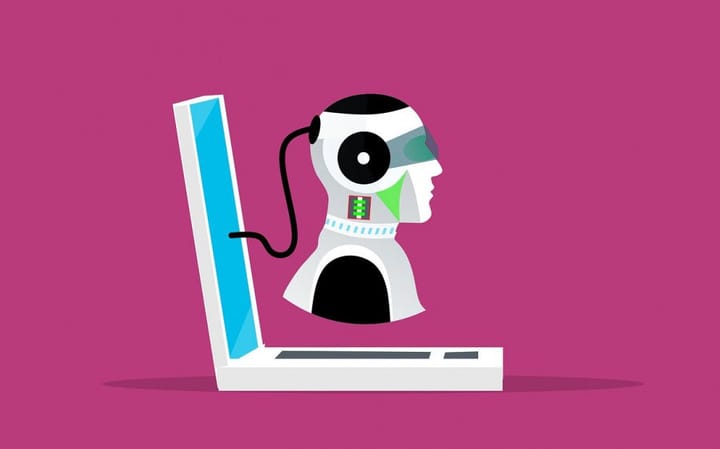
Comments ()